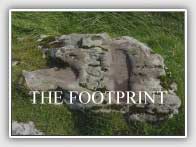FISHING, WHISKY AND STEAMERS
However the political tides turned, farming and fishing were the mainstay of the Kintyre economy and Campbeltown was, for many years, a small fishing village.
Although it was being steadily promoted and improved by the Dukes of Argyll, who were the major landowners.
In 1750 an Act was introduced by the government to encourage the building of suitable boats to combat the domination of the Dutch herring fleets. This Act paid a bounty of 30 shillings per ton for all herring fished, provided that the boats met certain criteria. To check these, all boats fishing around the Western Isles had to meet at Campbeltown on 1st September each year, to be inspected by Customs Officers. This had an enormous effect on the size of the fishing fleet at Campbeltown and thus, upon the town itself.
One of the main benefactors from the increase in fishing in Campbeltown was cooperage - the making of barrels. The herring were gutted,
salted and then shipped off, principally to Glasgow, in barrels.
In 1798, the first legal Campbeltown distillery opened, followed through the 1800's by 33 others. This again had a huge effect upon the town. Large, architect designed villas were built on Kilkerran Road and the Askomils for the whisky barons. Fast steamers plied a twice daily service up the Clyde to Glasgow. And the town, and the coopers, were again doing well.
Unfortunately, in the early 1900's, the fishing trade was starting to fall away. The bounty had long since been discontinued as no longer affordable. And there were large numbers of ex fish barrels available.
Always the entrepreneurs, it is reputed that the whisky trade started to make use of them. With dire consequences. It was noticed that something fishy was going on and, in the 1920's, the Campbeltown whisky trade almost completely lost its reputation and most of the remaining distilleries were closed.
Thankfully, this is no longer the case. Three distilleries are still active in Campbeltown and they produce some of the best single malts available. Glen Scotia (started in 1832) produces a lot of whisky, but only limited amounts of it are bottled. The majority going to add flavour to popular blended drams. Springbank (founded in 1828 on the site of a previous illicit still and the oldest independent family owned distillery in Scotland) is still going strong. It has a worldwide following of connoisseurs and holds regular tours and tastings. The third, Glengyle, is owned by the same family as Springbank and was re-opened in 2004, with the same high ideals.
Please note, these are merely snippets of history and are not to be taken either as authoritative or by any means comprehensive!






